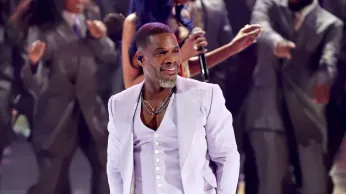
4 hours ago
Kirk Franklin Calls for Love and Inclusion, Rejects Homophobia in Candid Interview
READ TIME: 2 MIN.
Kirk Franklin, renowned gospel musician and faith leader, has become a prominent advocate for love, acceptance, and the dismantling of homophobia—particularly within the church. In a recent interview, Franklin spoke frankly about his confusion over the existence of homophobia and his commitment to unconditional love, regardless of sexual orientation. His convictions stem not only from his Christian beliefs but also from his personal journey as a father to Kerrion Franklin, who identifies as bisexual .
Franklin’s perspective on sexuality and acceptance is deeply connected to his role as a parent. He described the challenges and complexities of his relationship with Kerrion, emphasizing that his love for his son remains steadfast regardless of identity or circumstance. “I told my son, ‘There will never be any situation in your life that I will ever ever stop loving you. I will love who you love and I will stand where you stand,’” Franklin stated, highlighting the importance of acceptance and family solidarity .
Franklin also addressed the public scrutiny surrounding his family dynamics, particularly the leaked call between him and Kerrion and headlines regarding their estrangement. Despite these challenges, Franklin asserts that love and grace must remain central, saying, “We may not always agree. And that’s ok. But love will be the leading narrative” .
Franklin’s stance on LGBTQ+ acceptance is rooted in his interpretation of Christian teachings. He challenged the tendency in some religious communities to single out homosexuality for condemnation, arguing, “If homosexuality is a sin, then adultery is a sin, fornication is a sin, divorce is a sin, and none of them are bigger than the other. That’s why I have never understood homophobia” .
He further explained, “I am a lover of every human. I love people. That’s always been me. Just because I’m a Christian singer doesn’t mean I’m not human,” underscoring the need for compassion over judgment .
Franklin’s remarks reflect a growing movement within faith communities to embrace LGBTQ+ individuals, moving away from exclusion and toward affirming spaces. By foregrounding love as the guiding principle, Franklin’s message challenges religious leaders and followers alike to reconsider entrenched biases and cultivate true inclusivity.
The significance of Franklin’s statements resonates beyond his personal story, as they address the broader issue of LGBTQ+ inclusion in religious contexts. For many LGBTQ+ people, church environments have historically been places of exclusion and pain. Franklin’s open support offers a counter-narrative: one of belonging, affirmation, and hope. His approach aligns with calls from LGBTQ+ advocacy organizations for faith communities to recognize the dignity and worth of all individuals, regardless of sexual orientation or gender identity .
By using his platform to denounce homophobia and model acceptance, Franklin has sparked meaningful conversations within and outside the church. His words serve as a reminder that the journey toward inclusion is ongoing, and that public figures play a critical role in shaping attitudes and dismantling stigma.
As dialogue continues, Franklin’s commitment to unconditional love and advocacy for LGBTQ+ rights stands as an influential example for others in positions of faith and leadership.






